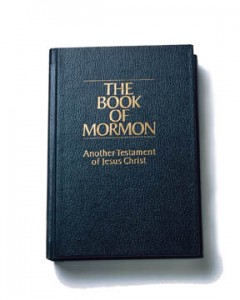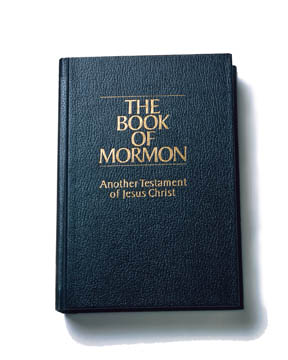There was a time when we could hear God the Father’s teachings at His knee. We lived in His presence and had regular opportunities to receive training, counsel, and comfort directly from Him. Then we agreed, at His request, to come here to earth to live for a time. Now we no longer had direct access to His personal presence, but He didn’t abandon us. He arranged many ways for us to stay in touch and to receive His counsel. We can pray directly to Him. We can hear His words through His modern day prophets. And, we can access His words from the past through the scriptures.
 Prophets have always been a critical part of God’s plan for us—a direct link between God and man, someone to take charge and make sure His gospel is taken into the world properly. It is through these prophets that we’ve learned who God is and what He wants of us. The scriptures are our access to those words.
Prophets have always been a critical part of God’s plan for us—a direct link between God and man, someone to take charge and make sure His gospel is taken into the world properly. It is through these prophets that we’ve learned who God is and what He wants of us. The scriptures are our access to those words.
Nephi, the first writer of the Book of Mormon said, “For my soul delighteth in the scriptures, and my heart pondereth them, and writeth them for the learning and the profit of my children.
16 Behold, my soul delighteth in the things of the Lord; and my heart pondereth continually upon the things which I have seen and heard.” ( Nephi 4)
The scriptures Nephi had were from the Old Testament. The Book of Mormon Student Manual says this about the scriptures Nephi obtained from a kinsman prior to leaving for their new homeland:
“When the Lord led Lehi and his colony out from Jerusalem, they were required to take with them the Brass Plates of which Laban had been the custodian. These plates—which Nephi acquired through his faith, works, and zeal (1 Ne. 3; 4)—were a volume of sacred scripture. They contained a record of God’s dealings with men from the beginning down to that day. They were ‘the record of the Jews’ (1 Ne. 3:3), a record of many of the prophecies from the beginning down to and including part of those spoken by Jeremiah. On them was the law of Moses, the five books of Moses, and the genealogy of the Nephite forbears. (1 Ne. 3:3, 20; 4:15–16; 5:11–14.)
“There was more on them than there is in the Old Testament as we now have it. (1 Ne. 13:23.) The prophecies of Zenock, Neum, Zenos, Joseph the son of Jacob, and probably many other prophets were preserved by them, and many of these writings foretold matters pertaining to the Nephites. (1 Ne. 19:10, 21; 2 Ne. 4:2, 15; 3 Ne. 10:17.)” (commentary for 1 Nephi 5:10–22.)
The Bible would continue to be written by Jewish prophets after Lehi (Nephi’s father) led his family out of Jerusalem and to a new land. At the same time, he and his descendants would add to the body of scripture then available by recording what would become known as the Book of Mormon. They would record their own dealings with the Lord, and these records would be kept for a future time—our time. The people of the Book of Mormon didn’t have these additional scriptures. The prophets simply kept them and handed them down to the next prophet.
While the Bible records were not kept as a unit, but gathered at a later time, the Book of Mormon records, under God’s instructions, were kept as a group, added to, and handed down. There was no need for someone to evaluate all the ancient records that were available and to decide what was scripture, and what was just writing. In time, when it became necessary to end and hide the records, they would be edited and shortened by the last prophets of the Book of Mormon, so that was left was only that which was most important.
Members of the Church of Jesus Christ of Latter-day Saints love the Bible. They also love the scriptures of the restoration—The Bible, the Book of Mormon, the Doctrine and Covenants, and the Pearl of Great Price. We long to hear every word God has spoken to us, and so we treasure these additional words made available in the last days.
“Those who join this Church do not give up their faith in the Bible—they strengthen it. The Book of Mormon does not dilute nor diminish nor de-emphasize the Bible. On the contrary, it expands, extends, and exalts it. The Book of Mormon testifies of the Bible, and both testify of Christ.
The first testament of Christ is the Bible’s Old Testament, which predicted and prophesied of the coming of the Savior, His transcendent life, and His liberating Atonement.
The second Bible testament of Christ is the New Testament, which records His birth, His life, His ministry, His gospel, His Church, His Atonement, and His Resurrection, as well as the testimonies of His Apostles.
The third testament of Christ is the Book of Mormon, which also foretells Christ’s coming, confirms the Bible’s account of His saving Atonement, and then reveals the resurrected Lord’s visit to the earth’s other hemisphere. The subtitle of the Book of Mormon, the clarifying purpose statement printed on the cover of every copy, is “Another Testament of Jesus Christ.”
Each of these three testaments is a part of the great, indivisible whole of the Lord’s revealed word to His children. They contain the words of Christ, which we have been admonished to feast upon as a means of qualifying for eternal life (see 2 Nephi 31:20). Those who think that one part is more important or more true than the other parts are missing some of the beauty and completeness of the canon of ancient scripture.” (M. Russell Ballard, “The Miracle of the Holy Bible,” Ensign, May 2007, 80–82)
The late Terrie Lynn Bittner—beloved wife, mother, grandmother, and friend—was the author of two homeschooling books and numerous articles, including several that appeared in Latter-day Saint magazines. She became a member of the Church at the age of 17 and began sharing her faith online in 1992.


